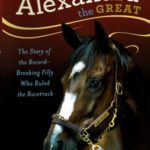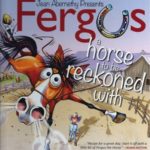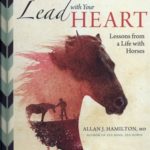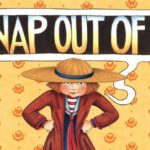Baxter Black, 66, is America?s unofficial cowboy poet laureate. His speaking engagements, NPR commentary, newspaper columns, magazine articles, RFD-TV television show, and books are full of wit and folksy wisdom and point to a keen mind. He earned his Doctor of Veterinary Medicine degree from Colorado State University and lives near Benson, Ariz. Deputy Editor Tom Wilmes caught up with Black before a recent book signing.

AC: Tell us about your new book, Lessons from a Desperado Poet.
BB: Someone asked FDR one time, ?Mr. President, how many books have you written in your lifetime?? And he replied, ?All together, too many.? For me it’s a diversion from the usual lunacy. I?ve published a few books before this one, but Lessons from a Desperado Poet has really been a lifetime in the making. It’s filled with lessons I?ve accumulated throughout the years, most of them learned the hard way. The subtitle is: ?How to find your way when you don’t have a map, how to win a game when you don’t know the rules, and when someone says it can’t be done, what they really mean is they can’t do it.?
When do you find time to write?
I write a great deal on the road, on the airplane and in hotels, because that’s pretty much the only private time I have. Sometimes I’ll sneak off and write a column.
The book seems geared toward making it on your own terms, is that how you?ve lived your life?
Half of the time I make a big deal about being an entrepreneur in the book, but the truth is I was scared. I grew up valuing a regular paycheck. Whatever I had to do to get up and go to work, if I could just get that check, it gave me value. I kept my veterinary license up not thinking that what I was doing could be a real career. I knew everyone and their dog by then just by traveling around the country [speaking on behalf of a pharmaceutical company], so I could have gotten a veterinary job if I?d ever gotten around to it, but since then I?ve never had to solicit a speaking job. It’s easy to take something like that for granted, but you can’t. That’s the key reason I’m doing what I’m doing today.
What was it like when you were growing up?
My dad grew up in Oklahoma during the ?30s and was the first in his family to go to college. He moved to West Virginia to get his master?s degree, and that’s where he met my mother. Then World War II came along and he joined the Navy. He and my mom got married on Christmas Eve, and he shipped out on Christmas Day. He came back, and I was born there somewhere along the way. You?d of thought that a guy that had stepped out of that toil, that rural life, would have just sat on his butt and bought a house in town, but he had to have a farm. It was in his blood, I guess. We had a horse, and chickens, and a cow when I was younger. I?d milk that sucker every morning. I went to a one-room schoolhouse where I was the only kid in both the third and the fourth grades. Then we moved to Texas and Dad went to work for Texas Tech. We lived there a couple years before Mother said, ?We have got to get out of here before these boys start to talk funny.? So we moved to Las Cruces.
What did you study in college?
I studied animal science at New Mexico State, mostly because that’s what I thought I was supposed to do. Then about the third year I looked around, and I couldn?t figure out what I was going to do with a degree in animal science, except maybe get drafted?this was in the ?60s. So I made up my mind that I?d try to get into veterinary school. My whole logic was this: After I graduated with my bachelor?s degree people would ask me, ?What do you do?? and I?d tell them, ?I have a degree in animal science.? Blank stare. But I figured if I went to vet school and somebody asked me, ?What do you do?? I could say, ?Well, I can fix your cow.? I wanted to be useful, and I also like working outdoors with my hands. I worked in feedlots the whole time I was in vet school and kept my license up for 13 years.
You also rodeoed some in your younger years, correct?
I did. I rode bulls, because I thought it would help me get girls, and it worked. I wasn?t on the college rodeo team, but I rode in their rodeos and took their money once or twice. There were also a lot of punkin? rollers in those days. My bull-riding career peaked in 1965 in St. John, Arizona, in the rain. I took second in the bull riding.
You talk about a transitional time when you moved to Denver. Can you tell us more about that?
I got divorced in ?79 and moved out of Idaho. It was a real mess. I owed everybody in the world money, and I was making house payments on a house I didn’t live in and car payments on a car I wasn?t driving. I took a job with a pharmaceutical company and moved to Denver because it was an easy travel hub.
I didn’t have a car when I first got to Denver. I didn’t have anything. I got off the airplane and found my way to a used car lot where I bought a 1966 Plymouth Fury for $400. I drove it six months and wrecked it. Then I bought a ?72 Lincoln?it was huge?and I paid $800 for it. That’s the one I wrecked after I asked a girl to marry me, and she said she was going to marry a dentist. That was the third wedding ring I?d bought. Later that night, I took a bottle of tequila and stuck it in my belt and walked until I?d walked that woman out of my heart.
I remember reaching an overpass by I-25 and scrambling down to the freeway. I waited for the traffic to pass and got out there on the center of the road and walked along the skinny rail that divides the highway. I was picking up hubcaps and singing to myself and being miserable. Then, once my vessel was empty, I took the next exit and wound up in a biker bar. They took one look at me and threw me out. The funny thing about tequila is that it doesn’t let you forget, but it also doesn’t care what you do. Three months later I married another [woman], and it’s lasted 25 years so far, so it was all for the good. I think the lesson there was, ?The secret to life is knowing how to take a fall.?
The pharmaceutical company job also launched your speaking career, correct?
I hit the road hard for the drug company and went all over giving these producer programs. We?d go to a little town, the company would invite in farmers and ranchers from all around, feed them dinner, and then I?d get up there and talk about ailments of the horse or of cattle or whatever disease was appropriate. Then the salesmen would do their thing. I refused to carry slides because they were heavy. I made my points with humor. Word started to spread among the community of livestock people, and it didn’t take long before people would call and say, ?Can that lunatic I heard about come out and give us a speech??
The company let me go after a couple of years, because they changed hands and needed me off the books. After the last speaking engagements were done, my intention was to go back into veterinary medicine, because I didn’t think whatever I was doing was a real job. But the speaking invitations continued to come, so I kept taking them.
Do you still travel as much?
Not as much as in the old days. We used to do 90 to 100 jobs a year, which doesn’t sound like a lot but you also have to factor in time getting to and from places. When my son was born, I told myself that I wasn?t going to do more than two engagements a week, and he just graduated from high school. My daughter is older, and she just gave me my first grandchild.
I try to be a pleasant kindness on the horizon when I am on the road, though. Normally [promoters] are dealing with agents who say things like, ?Well, you know he’s got to have the right kind of green tea.? I run into that all the time. ?Is there anything special you need, Mr. Black?? and ?Here, we have a room for you to hide from the audience in.? And I understand, but I’m not going to sit in a back room and hide. I’m usually one of the first ones there and the last guy to leave. Anyone who wants to gets their time. Want an autograph? Sure. Want your picture taken? No problem.







